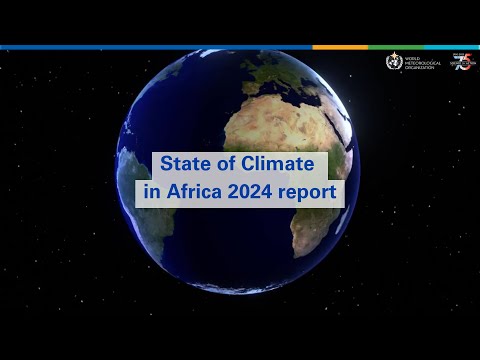Our Terms & Conditions | Our Privacy Policy
Extreme weather and climate change impacts hit Africa hard
Addis Ababa, Ethiopia/Geneva – Extreme weather and climate change impacts are hitting every single aspect of socio-economic development in Africa and exacerbating hunger, insecurity and displacement, according to the World Meteorological Organization (WMO) State of the Climate in Africa 2024 report.
Key messages
- Africa has warmest decade on record
- Sea surface temperature record high in 2024
- Droughts and floods destroy lives and livelihoods
- Natural climate drivers like El Niño play a role
- Digital transformation offers major potential
- Early warnings and climate adaptation must be scaled up
The year 2024 was the warmest or second-warmest year, depending on the dataset, and the past decade has been the warmest on record. Sea-surface temperatures around the continent were at record levels, with particularly rapid warming in the Atlantic Ocean and the Mediterranean Sea. Marine heatwaves impacted the biggest area since measurements started in 1993, it says.
“The State of the Climate in Africa report reflects the urgent and escalating realities of climate change across the continent,” said WMO Secretary-General Celeste Saulo. “It also reveals a stark pattern of extreme weather events, with some countries grappling with exceptional flooding caused by excessive rainfall and others enduring persistent droughts and water scarcity.”
“WMO and its partners are committed to working with Members to build resilience and strengthen adaptation efforts in Africa through initiatives like Early Warnings for All,” said Celeste Saulo. “It is my hope that this report will inspire collective action to address increasingly complex challenges and cascading impacts.”
The report highlights the challenges for agriculture and the environment; food, water and energy security; and health and education. But it also stresses opportunities and new tools to meet the challenges.
Artificial intelligence, mobile communication tools, and advanced weather prediction models are enhancing the accuracy and reach of weather services across Africa. However, further scaling up digital transformation requires greater investment in infrastructure, stronger data-sharing frameworks and more inclusive service delivery, it says.
A greater sense of urgency is needed to improve early warning systems, and strengthen climate resilience and adaptation, according to the report, which urges governments, development partners, and the private sector to accelerate climate-smart investment.
The WMO State of the Climate in Africa 2024 report is accompanied by a digital story map and is one of a series of WMO climate reports which seek to inform decision-making for national and regional climate strategies.
Temperatures
The average surface temperature across Africa in 2024 was approximately 0.86 °C above the 1991–2020 long-term average. North Africa recorded the highest temperature (1.28°C above the 1991-2020 average) and this is the sub-region of Africa which is warming fastest.
Extreme heat hit many parts of the continent during 2024, affecting agriculture, labour productivity and disrupting education.
Sea surface temperatures were the highest on record, ahead of 2023. Particularly large increases in sea surface temperatures have been observed in the Atlantic Ocean and Mediterranean Sea.
Almost the entire ocean area around Africa was affected by marine heatwaves of strong, severe or extreme intensity during 2024; especially the tropical Atlantic. From January to April, nearly 30 million km² was affected the largest since the start of monitoring in 1993, although the area decreased later in the year.
High ocean temperatures disrupt marine ecosystems and can intensify tropical storms, and combine with sea-level rise to pose additional threats to coastal communities.


Images are for reference only.Images and contents gathered automatic from google or 3rd party sources.All rights on the images and contents are with their legal original owners.



Comments are closed.